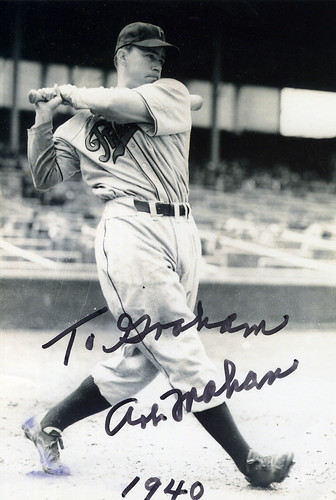On paper, Art Mahan had a bad year in 1940. In his only season playing Major League Baseball, Mahan hit .244 with two home runs, 39 runs batted in, and an OPS+ of 73, abysmal numbers for a starting first baseman. His team, the Philadelphia Phillies, stocked with end-of-the-road veterans and players who would be minor leaguers for better clubs finished 50-103, 50 games out of first place. When it was over, Mahan would be sent back to the minors in Little Rock, Arkansas, never again to approach the majors. But 1940 was a good year for Mahan.
I interviewed Mahan in February for a book I’m researching on another Phillie from 1940, Joe Marty. At the time of our interview, Mahan was 96 and one of three living teammates of Marty, who played for the Chicago Cubs and the Phillies from 1937 to 1941. For an enchanting, somewhat surreal two hours, I spoke by phone with Mahan and his son Ed. It has to be one of my all-time favorite interviews, and I know it’s one I’m grateful I got. Mahan died last Tuesday at 97 of congestive heart failure at his daughter’s home in Rydal, Pennsylvania.
Mahan spent most of his life and his final years surrounded by what he got out of 1940: family. He met his wife Helen that year, a month into his big league career on a blind date arranged by a friend from Villanova, where he graduated from in 1936. Mahan and his wife had nine children and were married 54 years until her death in 1996. It helped the Somerville, Massachusetts native not regret missing his chance to play for the Boston Red Sox.
“Growing up in Somerville, which is just practically right outside the ballpark everybody wanted to be a Red Sox,” Mahan told me during our interview. “And so… I wanted to be a good ballplayer and play for the Red Sox. Unfortunately for me, just before I got out of college the Red Sox signed Jimmie Foxx. And there was probably at that time, no better hitter than Jimmie Foxx. And I’ll always say personally, if I had signed with the Red Sox, I would have never have met or married my wife and had the children.”
There were other benefits Mahan got from being a Phillie. His son Ed explained that as his dad was young and single in 1940, he sent much of his $6,000 salary back to his family, helping his brothers make down payments on their houses. He got to play with his best friend and roommate from the minors, Bobby Bragan. Mahan also played with Wally Berger and future Hall of Fame outfielder Chuck Klein.
“Chuck Klein, when I was going to high school and everything else, he was a great hitter,” Mahan told me. “And then when I was in high school also, a new rookie came up to the Boston Braves, Wally Berger, and then of course, years later, I just couldn’t believe that I’m sitting in the same dang dugout with Wally Berger and Chuck Klein. I’ll never forget that, and I still treasure it today.”
After spending 1941 in the minors, Mahan enlisted in the Naval Air at the outset of World War II. He didn’t see combat, spending most of the war as a physical fitness instructor in Rhode Island. After the war ended, 32-year-old Mahan became player-manager of a semi-pro club in Providence for the 1946 season. Thereafter, he moved his family back to Philadelphia, took a job as the baseball coach at Villanova in 1950, and was made athletic director in 1960. He worked in the latter position until his retirement in 1978.
I asked Mahan if he looked back fondly on his big league career.
“I loved playing,” Mahan said. “Even though it was one year, I loved every second of it.”

Come on Graham. You spent two hours interviewing this fascinating man and you leave us hanging after just a few paragraphs? You’ve got to do another one about him and expand on some of the other things he told you.
I’m definitely going to expand on this for the book. For now, I’m just offering a short piece about who Mahan was, more of an obit really.
Thanks for sharing the interview, Graham. It’s always a pleasure to read about ballplayers who were grateful for their time in the Big Leagues.
Hi Graham.
This is my third email to you tonight so I better quit now or I’ll never get to bed. I went to Villanova from 1959 through 1963 and Art Mahon was the baseball coach and the AD as you said. Two players he had that went on to play in the majors were pitchers Frank Kreutzer and Bruce Howard. Howard was a pretty good pitcher but his biggest claim to fame is he was traded for Tommy John during his career.